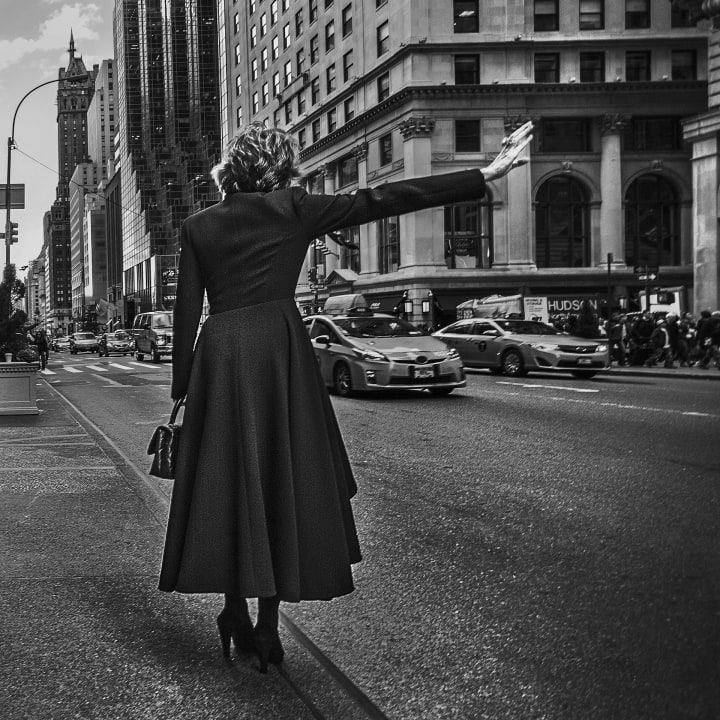The Fear of the Woman Who Doesn't Work
I'm a girl with a degree and nowhere to go.

It's been nearly six months since I graduated college, and I'm starting to feel a bit panicky. Job listings have become a blur on my laptop screen. Sometimes I don't know if it's from staring too hard or trying to hold back tears. I scroll past retail positions—not out of a sense of entitlement but from too many side-swipes with customers who made me cry in break rooms—but I feel the pressure starting to mount.
What if I can't find a job?
And then, quieter, is another voice piping up: What if I end up like my mom?
My mom also had her bachelor's degree. She wasn't a slacker student who made it by the skin of her teeth. She did her homework, got her college credits, and delighted her professors. Everyone thought she would go so far.
But she never got a job with her degree. She ended up marrying my dad, and she had me, and there was never a time that I knew her where she had a career or even a part-time job.
My dad never let her forget it either. When bills mounted from a one-spouse income and tempers flared, the fingers pointed every which way: "What can you say when you haven't worked a day in your life since we got married?"
My mother's sister—my aunt—didn't fare much better when she lost her job in the early 2000's and petered off to a point where she stopped applying for new positions elsewhere. Bouts with depression didn't help her either. There were days she wouldn't get out of bed until the afternoon. It was not an easy time for her, especially because her husband had little tolerance for a woman who wouldn't pull her weight in the realm of household income. It has become a common refrain at parties for him to say, "My wife hasn't worked in thirty years"—an exaggeration meant for laughs, maybe, but I'm sure it cuts just the same.
Then there's the melancholic tale of one of my friends whose sister has a master's degree—yet her anxiety is so debilitating that she has trouble leaving the house and holding down a steady job. As someone who also wars with anxious feelings on a daily basis, I understand the struggle. And I also hold the same fears for myself.
What's my point in all this?
I honestly feel like the "job hunt" and "career mentality" cultures have come to a point where they're destroying some of us along the way. And, lest the title of this article steer you wrong, I think that these things negatively impact both women and men.
I remember crying a bit when I found out that someone I know, a young woman many years my junior, received a raise of $20K after only a few years of working at her company. Meanwhile, I berated myself for struggling just to find an entry-level position that probably wouldn't even match the money paid just to get my education in the first place. Even if the logic wasn't there for the comparison to upend me, I was still bothered—and ever more anxious in regards to my own future.
I remember sending out dozens of applications one month and feeling the crushing weight of silence. "No one wants you," the yawning void seemed to say.
And, when society tells you that you must have a job to have worth, then where does that leave you?
The Burden of What It Means to "Have a Job"

"You need money to live. You need to eat, you need shelter, you need utilities, you need provisions. Life is not free."
These things have been drilled into me. I remember living in danger of things like the water and the gas being shut off because my dad did not manage money well enough to pay the bills on time. I lived the kind of life where sometimes I did not know what I would have for dinner—if there would even be dinner.
But by the time I was old enough to have a job—part-time work because that's all I was really qualified for—I would become terribly drained by the mental strain it took to deal with my job. Sure, some would snidely say, "You were just working retail," but I constantly had to have the "on" switch flipped to be ready for the waiting customers. "Smile up," I would tell myself as I stared down another potential disaster in the face.
One holiday season, a woman had to wait in a long line—per the timing, given it was right before Christmas—and proceeded to tell me, "You have a bad attitude," because I didn't do something right in her perspective (I never actually found out what that was, thinking back). While I rang up the next handful of customers, I went through the motions as I silently cried, and no one said a word to me because I guess they were startled by my open display of emotion that I did, nonetheless, not verbalize in any way (despite the tears streaming down my face).
I worked a few years of holiday rushes like that, and working became synonymous with exhaustion. During those jobs, I couldn't even fathom actually enjoying the work I did. Even now, I still have dreams of working a register with queue upon queue of customers ready to be waited on. I doubt I will ever erase my time in retail from my mind.
You may go, "What does this have to do with an actual career?"—and I'm getting there. What I think my part-time work put into me was the fear of what an actual 9-to-5 job would entail. I've had bad bosses, I've had crappy shifts, I've had unhappy coworkers: would all these things and more be what I had to look forward to in the big, wide working world?
And, as I scroll through job listings for yet another day, I feel this sense of trepidation that things will only get worse from here when I'm actually working to earn money just to ensure my survival.
We Can't All Be "Career Women"

There's an ideal that's come alive over the past few decades where women can, at last, "have it all": the husband, the babies, the career, the income. And for a lot of women, this is possible. It's, dare I say it, the dream in many cases.
But there are women who will never have it all. Whether through disabilities or mental illness challenges or any other myriad of reasons, some women just can't juggle all these things. Others instead want to be stay-at-home mothers, the housewives of a believed-bygone era, during a time when women are often chastised if they don't add to the household earnings in some way.
My mother had struggles with her health, but no doubt some days she questioned her decision and even thought what might have happened if things had gone a bit differently. While she devoted herself to my upbringing, I sometimes wondered if she ever had insecurities over the fact that she did not have "a career." I know even some friends and relatives threw it in her face at times that she was not a "working woman." And I'm sure that bothered her even more deeply than I had ever considered possible.
I feel it now, when I wonder if my relatives are talking about me regarding my lack of full-time employment, and I know there are other women out there who feel that same pressure that they somehow matter less because they aren't out there eight hours a day running the hamster wheel of life. Some of them are mothers who don't want to leave their children to daycare (if they can even afford it) while others are dealing with battles that may not be apparent to the eye.
The greater question, I suppose, is this: do all of us need to "have it all" to be happy and fulfilled in our lives?
Breaking the Cycle

At this time in my life, even coming out of a worldwide pandemic that drastically changed the workplace system, I think my greatest fear is that I'll continue to wade through a swamp where I am jobless and wandering. But then there is another fear that I'll settle for a position just to have a job, any job, that will have me.
Will I buckle under pressure when a call comes and go, "Yes," just to say I have a job? Will I be able to withstand the judgment from relatives who side-eye me if I don't get a call and have to say, "No, I still don't have a job"?
I know I'm lucky to be able-bodied and mentally stable to be able to apply for jobs and take the interviews when they come. But I just had my first post-graduation job interview two weeks ago and I haven't heard a thing since. Family were quick to say what I had done wrong in the process—not acknowledging that we are still in a pandemic and many people of all qualification levels are looking for work—but I have to be my own advocate and wear a thicker skin.
Underneath it all, though, I picture my mother—my mother with a degree that didn't lead to a career—and worry that I'll somehow end up just the same.
You may think I'm just another whining millennial who's too entitled and expects everything handed to her, but the fear? Believe me, it's real.

If you'd like to read other articles and writings from me, here's the handy little link to my profile page. Please leave a heart before you go if you enjoyed this article. Your support means the world to me!
About the Creator
Jillian Spiridon
just another writer with too many cats
twitter: @jillianspiridon






Comments
There are no comments for this story
Be the first to respond and start the conversation.